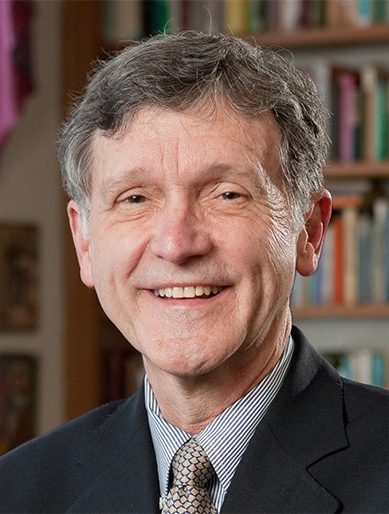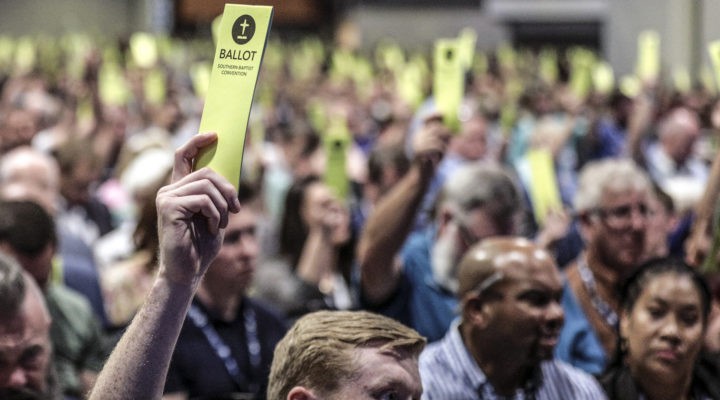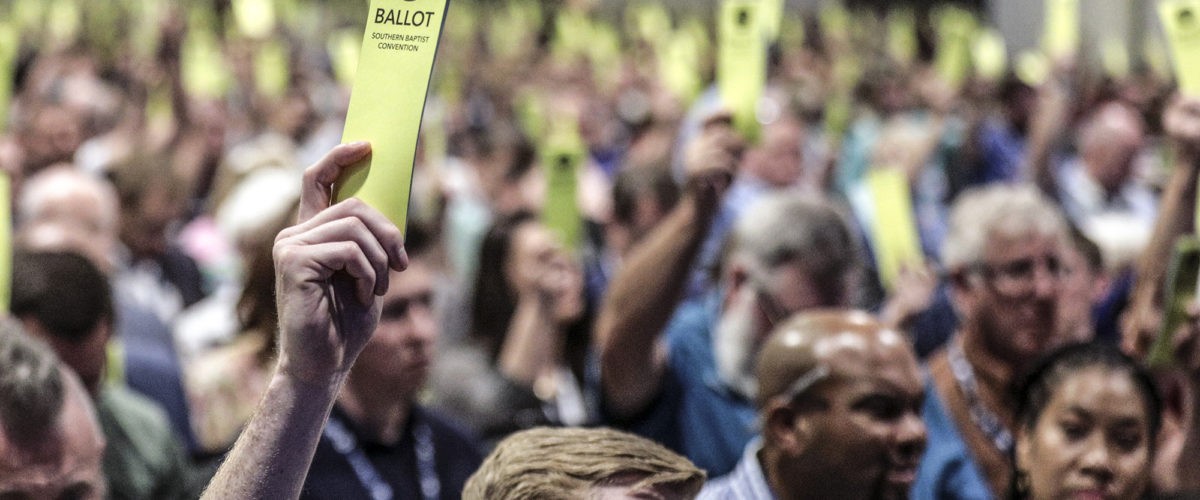The Southern Baptist Convention’s continued embrace of fundamentalism and conservative politics is undermining its ability to “moralize to American culture,” church historian Bill Leonard said during a lecture at Baylor University.
“How did a once engaging gospel of grace, repentance, forgiveness and reconciliation in Christ become such a harsh, doctrinaire and angry faith? First, SBC fundamentalism narrowed denominational boundaries. To use a political term, it narrowed its base,” said Leonard, founding dean and professor emeritus of church history at Wake Forest University School of Divinity.
While decades in the making, the trend has intensified with recent crackdowns on violations of doctrinal purity, including the February expulsion of Saddleback Church for appointing a woman teaching pastor and some congregations expelling individual members for failing to sign prescribed statements, said Leonard, also a senior columnist for Baptist News Global.
He singled out First Baptist Church in Jacksonville, Fla., which made headlines earlier this year for requiring members to sign a “biblical sexuality” statement.
“How many documents do you have to sign to stay Southern Baptist?”
“Failure to sign meant removal from church rolls. Fundamentalist doctrinal purity continues to narrow the SBC base theologically. How many documents do you have to sign to stay Southern Baptist?” Leonard asked during his recent address titled, “Fundamentalizing Faith, Co-Opting Culture: Confronting Evangelical Enigmas in 2023” given to the Baylor religion department.
The denomination’s current trajectory originated from the emergence of evangelicalism and fundamentalism in the Protestant awakenings and revivals in the 18th and 19th centuries, he said.

Bill Leonard
“Evangelicals” were those who emphasized a personal conversion experience with Christ as the entry point for Christianity. “But divisions over orthodoxy developed over debates as to whose church the saved should join,” Leonard said. “Sticklers of orthodoxy had morphed into fundamentalists (who) demanded purity of doctrine and opposition to theological and political liberalism.”
They also opposed liberal theologies and secular humanism while promoting biblical inerrancy, he said.
By the middle of the 20th century, conservative Christians were divided into two groups: those who were militantly separatist and politically extreme, and neo-evangelicals who sought to reclaim the nation for Christ. Billy Graham was part of the latter movement, Leonard said.
“In 2023, it appears certain individuals and groups have moved away from Billy Graham’s neo-evangelical emphasis and toward fundamentalist definitions of evangelicalism, personified in his son Franklin,” Leonard explained.
Further, “The Southern Baptist Convention is something of a case study in one denomination’s intentional decision to redefine or reclaim fundamentalism by defining evangelical orthodoxy with particular emphasis on the doctrine of biblical inerrancy.”
“The Southern Baptist Convention is something of a case study in one denomination’s intentional decision to redefine or reclaim fundamentalism.”
Within the SBC, that movement took shape during the conservative dominance of the 1980s and 1990s when fundamentalist leaders promised evangelistic growth, preservation of orthodoxy and expanded missions as perceived liberals were removed from leadership, Leonard said.
“As leaders increasingly used the term ‘evangelical’ to describe their identity, their theological assertions and methods seemed more fundamentalist oriented. Over time, they both coopted, and were coopted by, elements of conservative politics that would be necessary to defeat the secularism that was engulfing American life and culture.”
But the denomination has continued to lose its relevance to the culture it seeks to reach, Leonard warned. In 2021, membership in SBC churches fell to just under 13.7 million — the lowest in more than four decades.
“SBC fundamentalism impacts evangelistic witness,” Leonard said. “The call to declare your faith in Christ is a hallmark of Southern Baptist outreach. Although the rhetoric of conversion continues, actual conversions reflect considerable decline. Has concern for doctrinal orthodoxy distracted from the pursuit of the religion of the heart?”
The promotion of political orthodoxy — including claims by some leaders that a specific candidate alone was right for Christian voters — also has narrowed the SBC base, he asserted. “Has that created a new difficulty in taking the case of the gospel to the broader culture and reaching and retaining young converts?”
And the continued emphasis on biblical complementarianism and scandals around sexual abuse turned off even more potential converts to the SBC despite its claim to set the moral standard for the nation, Leonard said. “Those strenuous moral declarations were undermined in 2022 when the SBC was forced to acknowledge two decades of sexual abuse by clergy and laity — actions overlooked or ignored by conventional leaders, agencies and congregations.”
Even as efforts are under way to correct, repent and take action on cases of abuse, the SBC is divided about the appropriate response and extent of the abuse, further alienating many Americans, the historian added. “Until the fruits of repentance are evident, and restitution is actualized, the SBC is challenged to moralize to American culture.”
Just as damaging to the SBC’s witness is its reputation on race, including its founding in 1845 to support slavery and the subsequent support of Jim Crow and the spread of white supremacist values by the denomination’s international missionaries, he continued. The SBC’s 1995 apology for slavery was overshadowed more recently when the six SBC seminary presidents denounced Critical Race Theory without consulting Black pastors and churches.
This is an example of when fundamentalism and the fixation on biblical inerrancy “can get out of hand,” he said.
“Once any of us decides that our interpretation of the biblical text is the only possible sign of God’s truth, we’ve opened the door not just to debate and conflict, but potential inquisition, particularly in a nation armed to the teeth.”
SBC fundamentalism raises worrisome questions about the potential loss of the gospel of grace, forgiveness and reconciliation, Leonard said. “I would suggest that these concerns, particularly the use of Scripture, constitute an evangelical enigma of the present moment — a fundamentalizing of evangelical faith and a coopting of culture that strikes at the heart of the evangelical witness to the Jesus’ story.”
Related articles:
What does history teach us about Saddleback Church and the SBC? | Opinion by Jason Koon


